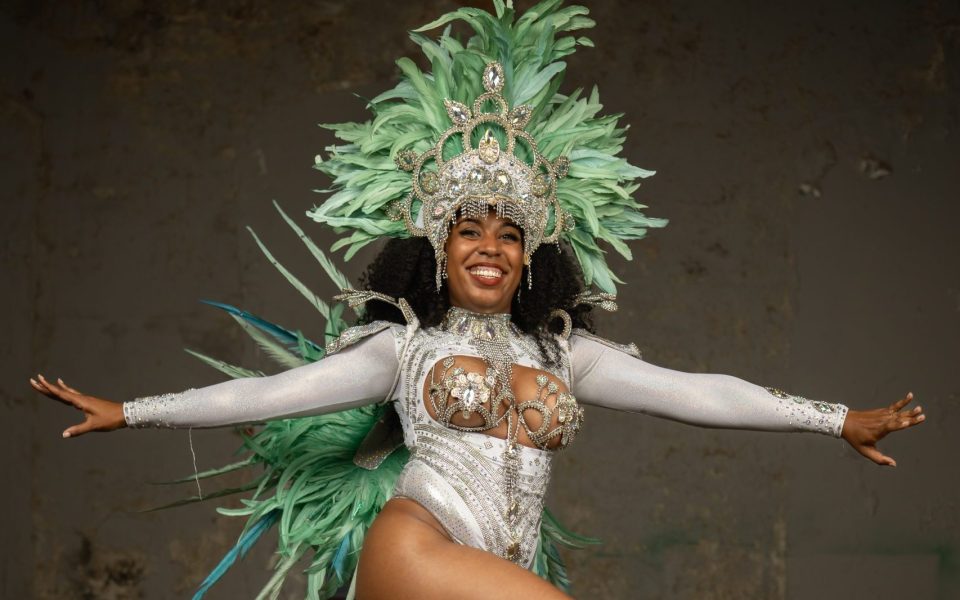Featured photo: Samba dancer Courtney Feliz will be giving dance lessons during Festa (photo by Vyzion Photography)
When Suzy McCalley is in Brazil, many people see her as a “gringo,” or a non-Hispanic or Latino person. But when she’s back in the US, she feels differently.
“I feel very Brazilian sometimes,” says McCalley on a video call from her family’s home just outside of Rio de Janeiro. “My identity is multilayered. Sometimes I get that feeling of, Where do I really belong? Where is home?”
McCalley — who owns and operates the Breathing Room in Winston-Salem and is married to Mayor Allen Joines — was born and raised in Brazil to a Brazilian mother and American father until she was 9 years old. That’s when her family moved to the US, first by way of Miami, then stints in Texas. Eventually she found herself in Winston-Salem, the city she’s called home for the last 11 years.
Having been in the US for more than two decades, McCalley says that staying connected to Brazil is important to her; she travels back a few times a year to get her fix.
“I’m very much Brazilian American,” she explains. “I love the US, and I love Brazil. I’m one of those folks in a unique position to comment on both and share both.”
This year, McCalley is using that unique perspective to host a series of events in Winston-Salem that share parts of Brazilian culture. During four Saturdays in September, multiple organizations across the city will be collaborating to host free events as part of Brazilian Festa featuring Samba music, dance and Brazilian food.

“We have Fiesta every year, but this is the first that is for Brazilian culture specifically,” McCalley explains.
On Sept. 14, the city’s Hispanic League will be putting on their 32nd Fiesta Festival showcasing Hispanic heritage and culture.
“I think a lot of people in the Triad don’t know a lot about Brazilian culture,” she says. “I think it’s such a rich culture that I wanted to share it.”
Part of the effort is to teach people about some of the nuances that make Brazilian culture different from other Hispanic or Latin communities. For example, in Brazil, people don’t speak Spanish as the primary language. Instead, they speak Portuguese. And there’s so much else to share, she says.
“There’s a large emphasis on joy and celebration,” McCalley says. “In Brazil, people are often singing, dancing in the streets. It’s just a part of life.”
As a musician and performer, she says she misses that vibrancy when she’s back stateside.

A large aspect of Brazilian culture that McCalley hopes will captivate attendees is samba, a kind of music and dance born from the late 19th and early 20th centuries in Brazil. With roots in African music, samba is marked by its percussive patterns and eventually helped spawn subgenres like bossa nova which took on more elements from jazz. A fusion of indigenous Brazilian music with African influence and Portuguese flair, the genre is seen as one of Brazil’s most recognizable and important cultural touchstones.
“The music, along with the style of dance, was a form of resistance,” McCalley says. “It was an opportunity to make social commentary on social issues like racism, classism, lack of opportunities for people of color, the conditions of poverty that people lived in. For that reason, it was persecuted and went underground for a while. They said it was just for vagabonds and no-good, low-life, street people.”
In that way, McCalley says she sees samba as similar to hip-hop for its roots in resistance.
“The movement in samba was to legitimize itself through things like the Samba school and then Carnival where samba is the focus,” she says.
During the Festa, attendees will have a chance to take a samba dance class with dancer Courtney Feliz, hear a live samba band and even make their own Carnival headdress. A local husband-wife catering business, the Brazzo Experience, will be offering Brazilian food at the events as well. The vision is to bring a little bit of Brazil 4,000 miles back to Winston-Salem with her. The event is for everyone, she says.
“They’re going to get a little taste,” McCalley says. “A little appetizer.”
Learn more about Brazilian Festa at brazilianfesta.com.
Join the First Amendment Society, a membership that goes directly to funding TCB‘s newsroom.
We believe that reporting can save the world.
The TCB First Amendment Society recognizes the vital role of a free, unfettered press with a bundling of local experiences designed to build community, and unique engagements with our newsroom that will help you understand, and shape, local journalism’s critical role in uplifting the people in our cities.
All revenue goes directly into the newsroom as reporters’ salaries and freelance commissions.


Leave a Reply